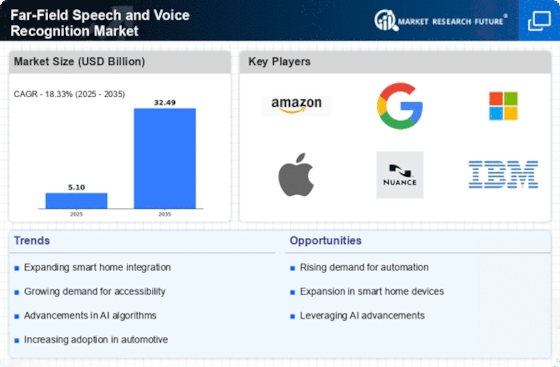-
Executive Summary
-
Market Attractiveness Analysis
-
Global Far-field Speech and Voice Recognition Market, by Microphone Solution
-
Global Far-field Speech and Voice Recognition Market, by Component
-
Global Far-field Speech and Voice Recognition Market, by Application
-
Global Far-field Speech and Voice Recognition Market, by Region
-
Scope of the Report
-
Market Definition
-
Scope of the Study
-
Markets Structure
-
Key Buying Criteria
-
Macro Factor Indicator Analysis
-
Market Research Methodology
-
Research Process
-
Secondary Research
-
Primary Research
-
Forecast Model
-
List of Assumptions
-
Market Insights
-
Market Dynamics
-
Introduction
-
Drivers
-
Restraints
-
Opportunities
-
Challenges
-
Technological Trends
-
Regulatory Landscape/Standards
-
Market Factor Analysis
-
Supply/Value Chain Analysis
- R&D
- Manufacturing
- Distribution & Sales
- Post-Sales Monitoring
-
Porter’s Five Forces Model
- Threat of New Entrants
- Bargaining Power of Suppliers
- Bargaining Power of Buyers
- Threat of Substitutes
- Intensity of Rivalry
-
Global Far-field Speech and Voice Recognition Market, by Component
-
Introduction
-
Microphones
- Market Estimates & Forecast, 2024-2032
- Market Estimates & Forecast, by Region, 2024-2032
-
Digital Signal Processors
- Market Estimates & Forecast, 2024-2032
- Market Estimates & Forecast, by Region, 2024-2032
-
Software
- Market Estimates & Forecast, 2024-2032
- Market Estimates & Forecast, by Region, 2024-2032
-
Global Far-field Speech and Voice Recognition Market, by Microphone Solution
-
Introduction
-
Single Microphone
- Market Estimates & Forecast, 2024-2032
- Market Estimates & Forecast, by Region, 2024-2032
-
Linear Arrays
- Market Estimates & Forecast, 2024-2032
- Market Estimates & Forecast, by Region, 2024-2032
-
Circular Arrays
- Market Estimates & Forecast, 2024-2032
- Market Estimates & Forecast, by Region, 2024-2032
-
Global Far-field Speech and Voice Recognition Market, by Application
-
Introduction
-
In-Vehicle Infotainment Systems
- Market Estimates & Forecast, 2024-2032
- Market Estimates & Forecast, by Region, 2024-2032
-
Smart TV
- Market Estimates & Forecast, 2024-2032
- Market Estimates & Forecast, by Region, 2024-2032
-
Smart Speakers
- Market Estimates & Forecast, 2024-2032
- Market Estimates & Forecast, by Region, 2024-2032
-
Robotics
- Market Estimates & Forecast, 2024-2032
- Market Estimates & Forecast, by Region, 2024-2032
-
Smart Thermostats
- Market Estimates & Forecast, 2024-2032
- Market Estimates & Forecast, by Region, 2024-2032
-
Smart Lighting
- Market Estimates & Forecast, 2024-2032
- Market Estimates & Forecast, by Region, 2024-2032
-
Others
- Market Estimates & Forecast, 2024-2032
- Market Estimates & Forecast, by Region, 2024-2032
-
Global Far-field Speech and Voice Recognition Market, by Region
-
Introduction
-
North America
- Market Estimates & Forecast, by Country, 2024-2032
- Market Estimates & Forecast, by Component, 2024-2032
- Market Estimates & Forecast, by Microphone Solution, 2024-2032
- Market Estimates & Forecast, by Application, 2024-2032
- US
- Canada
- Mexico
-
Europe
- Market Estimates & Forecast, by Country, 2024-2032
- Market Estimates & Forecast, by Component, 2024-2032
- Market Estimates & Forecast, by Microphone Solution, 2024-2032
- Market Estimates & Forecast, by Application, 2024-2032
- Germany
- UK
- France
- Italy
- Rest of Europe
-
Asia-Pacific
- Market Estimates & Forecast, by Country, 2024-2032
- Market Estimates & Forecast, by Component, 2024-2032
- Market Estimates & Forecast, by Microphone Solution, 2024-2032
- Market Estimates & Forecast, by Application, 2024-2032
- Japan
- China
- India
- Rest of Asia-Pacific
-
Rest of the World
- Market Estimates & Forecast, by Region, 2024-2032
- Market Estimates & Forecast, by Component, 2024-2032
- Market Estimates & Forecast, by Microphone Solution, 2024-2032
- Market Estimates & Forecast, by Application, 2024-2032
- Middle East & Africa
- South America
-
Company Landscape
-
Competitive Overview
-
Competitor Dashboard
-
Major Growth Strategy in the Global Far-field Speech and Voice Recognition Market
-
Competitive Benchmarking
-
Key Developments & Growth Strategies
- Product Launch/Service Deployment
- Mergers & Acquisitions
- Joint Ventures
-
Company Profiles
-
Synaptics Inc.
- Company Overview
- Product/Business Segment Overview
- Financial Updates
- Key Developments
-
Texas Instruments Inc.
- Company Overview
- Product/Business Segment Overview
- Financial Updates
- Key Developments
-
Qualcomm Inc.
- Company Overview
- Product/Business Segment Overview
- Financial Updates
- Key Developments
-
Sensory Inc.
- Company Overview
- Product/Business Segment Overview
- Financial Updates
- Key Developments
-
STMicroelectronics NV
- Company Overview
- Product/Business Segment Overview
- Financial Updates
- Key Developments
-
Harman International Industries, Inc.
- Company Overview
- Product/Business Segment Overview
- Financial Updates
- Key Developments
-
Andrea Electronics Corporation
- Company Overview
- Product/Business Segment Overview
- Financial Updates
- Key Developments
-
Cirrus Logic Inc.
- Company Overview
- Product/Business Segment Overview
- Financial Updates
- Key Developments
-
Microsemi Corporation
- Company Overview
- Product/Business Segment Overview
- Financial Updates
- Key Developments
-
DSP Group, Inc.
- Company Overview
- Product/Business Segment Overview
- Financial Updates
- Key Developments
-
Knowles Corporation
- Company Overview
- Product/Business Segment Overview
- Financial Updates
- Key Developments
-
Meeami Technologies, Inc.
- Company Overview
- Product/Business Segment Overview
- Financial Updates
- Key Developments
-
Alango Technologies Ltd
- Company Overview
- Product/Business Segment Overview
- Financial Updates
- Key Developments
-
Fortemedia, Inc.
- Company Overview
- Product/Business Segment Overview
- Financial Updates
- Key Developments
-
VOCAL Technologies, Ltd
- Company Overview
- Product/Business Segment Overview
- Financial Updates
- Key Developments
-
Conclusion
-
-
LIST OF TABLES
-
Global Far-field Speech and Voice Recognition Market, by Region, 2024-2032
-
North America: Far-field Speech and Voice Recognition Market, by Country, 2024-2032
-
Europe: Far-field Speech and Voice Recognition Market, by Country, 2024-2032
-
Asia-Pacific: Far-field Speech and Voice Recognition Market, by Country, 2024-2032
-
Middle East & Africa: Far-field Speech and Voice Recognition Market, by Country, 2024-2032
-
South America: Far-field Speech and Voice Recognition Market, by Country, 2024-2032
-
Global Far-field Speech and Voice Recognition Microphone Solution Market, by Region, 2024-2032
-
North America: Far-field Speech and Voice Recognition Microphone Solution Market, by Country, 2024-2032
-
Europe: Far-field Speech and Voice Recognition Microphone Solution Market, by Country, 2024-2032
-
Asia-Pacific: Far-field Speech and Voice Recognition Microphone Solution Market, by Country, 2024-2032
-
Middle East & Africa: Far-field Speech and Voice Recognition Microphone Solution Market, by Country, 2024-2032
-
South America: Far-field Speech and Voice Recognition Microphone Solution Market, by Country, 2024-2032
-
Global Far-field Speech and Voice Recognition Application Market, by Region, 2024-2032
-
North America: Far-field Speech and Voice Recognition Application Market, by Country, 2024-2032
-
Europe: Far-field Speech and Voice Recognition Application Market, by Country, 2024-2032
-
Asia-Pacific: Far-field Speech and Voice Recognition Application Market, by Country, 2024-2032
-
Middle East & Africa: Far-field Speech and Voice Recognition Application Market, by Country, 2024-2032
-
South America: Far-field Speech and Voice Recognition Application Market, by Country, 2024-2032
-
Global Microphone Solution Market, by Region, 2024-2032
-
Global Application Market, by Region, 2024-2032
-
North America: Far-field Speech and Voice Recognition Market, by Country
-
North America: Far-field Speech and Voice Recognition Market, by Microphone Solution
-
North America: Far-field Speech and Voice Recognition Market, by Application
-
Europe: Far-field Speech and Voice Recognition Market, by Country
-
Europe: Far-field Speech and Voice Recognition Market, by Microphone Solution
-
Europe: Far-field Speech and Voice Recognition Market, by Application
-
Asia-Pacific: Far-field Speech and Voice Recognition Market, by Country
-
Asia-Pacific: Far-field Speech and Voice Recognition Market, by Microphone Solution
-
Asia-Pacific: Far-field Speech and Voice Recognition Market, by Application
-
Middle East & Africa: Far-field Speech and Voice Recognition Market, by Country
-
Middle East & Africa: Far-field Speech and Voice Recognition Market, by Microphone Solution
-
Middle East & Africa: Far-field Speech and Voice Recognition Market, by Application
-
South America: Far-field Speech and Voice Recognition Market, by Country
-
South America: Far-field Speech and Voice Recognition Market, by Microphone Solution
-
South America: Far-field Speech and Voice Recognition Market, by Application
-
LIST OF FIGURES
-
Global Far-field Speech and Voice Recognition Market Segmentation
-
Forecast Methodology
-
Porter’s Five Forces Analysis of the Global Far-field Speech and Voice Recognition Market
-
Value Chain of the Global Far-field Speech and Voice Recognition Market
-
Share of the Global Far-field Speech and Voice Recognition Market in 2023, by Country (in %)
-
Global Far-field Speech and Voice Recognition Market, 2024-2032
-
Global Far-field Speech and Voice Recognition Market Size, by Microphone Solution, 2023
-
Share of the Global Far-field Speech and Voice Recognition Market, by Microphone Solution, 2024-2032
-
Global Far-field Speech and Voice Recognition Market Size, by Application, 2024-2032
-
Share of the Global Far-field Speech and Voice Recognition Market, by Application, 2024-2032

















Leave a Comment